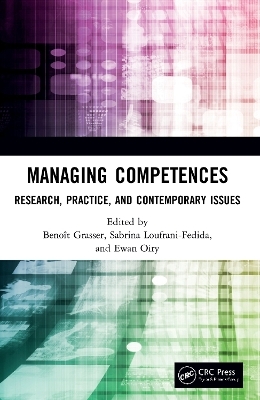
Managing Competences
Routledge (Verlag)
978-0-367-56479-7 (ISBN)
Managing Competences: Research, Practice, and Contemporary Issues draws together theoretical and practical research in competence management. It provides a wealth of knowledge concerning emerging and contemporary issues, such as the multilevel approach to competence, the development of collective competence, the strategies of competence management, and the tools for managing competences as well as the organizational dynamics of competences. Moreover, the book provides a critical approach to research and practitioners’ continued engagement in competence management research and practice.
Research in competence management has more recently entered an era more open to doubt and questioning: Is there a solid theoretical foundation that supports the concept of competence? What is the contribution of research on employees’ competences to human resources management in particular, and more generally to management? Is there not a risk of diluting the concept of competence by considering it at the individual, collective, organizational, and strategic levels? Today, is it still possible to manage competences in a world where the boundaries of the organizations are more and more porous? These questions, and many others, probably explain why a field that seemed well-identified and well-structured yesterday, has given way today to new, highly diverse analyses of competences by researchers and practitioners.
This contributed volume seeks to answer these pressing issues and is a collective means for responding to them. The book brings together multiple streams of research in the field about emerging and contemporary issues, including multidimensional HRM systems, the rise of forms of collaborative management, the intensification of the use of digital and robotic technologies, the rise of the regime of remote and networked operations, the increasing heterogeneity of the status of workers, and changes in regulations concerning work and its recognition.
1. The Conceptual Travel of Competence: Building a Bridge between North American and European Approaches. 2. Competency Management Tools: A Paradoxical Longevity. 3. Competence as a Revelator of Blind Spots in the Talent Management Literature. 4. Developing Soft Skills through Social Learning: A Model Implemented at a Canadian Business School. 5. Competences-Based Assessment of Employability: How to Deconstruct a Variety of Interpretations and Articulations? 6. Together, Do We Go Further?: The Dynamic between Rules and Collective Competence. 7. The Development of Collective Competence with an Inter-Organizational Group: A Proximity Perspective. 8. How to Organize Territorial Competence Management? 9. Market for Competences: When Attractiveness Drives Competitiveness. 10. From the Transmission of Skills to the Concept of Competence: Lessons from a Case Study in the Aerospace Industry. 11. Competences and Work Contexts: Learning from the French Ergonomic Approach. 12. Situated Individual Competences, Practices, and Institutional Logics: Identification of Blended Practices among Front-Line Employees in a Railway Company. 13. Social Innovation Processes and Collective Entrepreneurial Competence: The Case of the Jardins de Cocagne (Cocagne Gardens). 14. Contextualizing Intercultural Competencies: Genesis, Concepts, and Research Agenda. Conclusion to the Handbook: Toward a Contextualized and Multilevel Approach of Managing Competences.
| Erscheinungsdatum | 13.09.2024 |
|---|---|
| Zusatzinfo | 18 Tables, black and white |
| Verlagsort | London |
| Sprache | englisch |
| Maße | 156 x 234 mm |
| Themenwelt | Geisteswissenschaften ► Psychologie ► Allgemeine Psychologie |
| Geisteswissenschaften ► Psychologie ► Arbeits- und Organisationspsychologie | |
| Wirtschaft ► Volkswirtschaftslehre | |
| ISBN-10 | 0-367-56479-3 / 0367564793 |
| ISBN-13 | 978-0-367-56479-7 / 9780367564797 |
| Zustand | Neuware |
| Haben Sie eine Frage zum Produkt? |
aus dem Bereich


